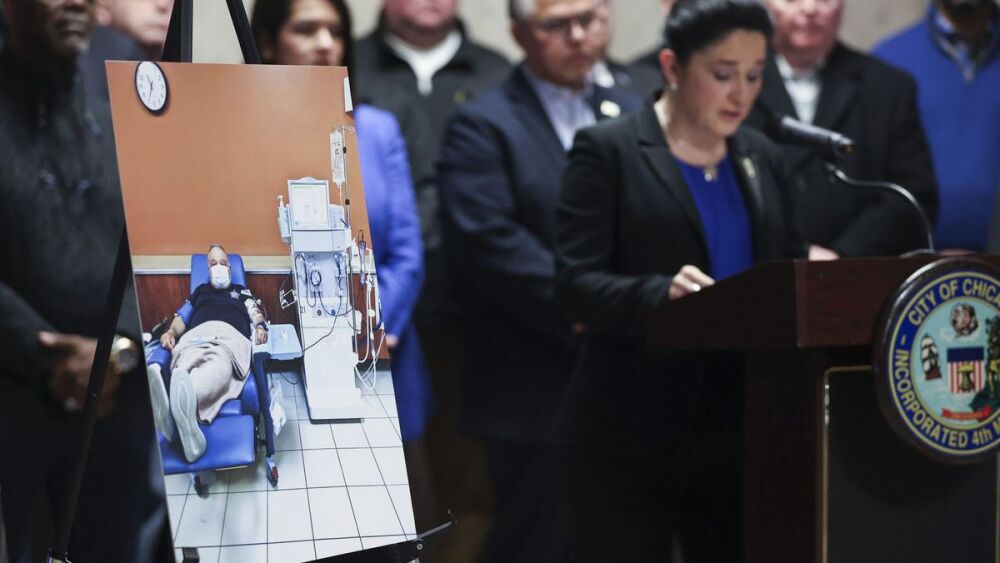By Jeremy Gorner
Chicago Tribune
CHICAGO — A measure that would make it easier for Chicago’s first responders to acquire full disability benefits if they were sickened by COVID-19 gained traction Thursday when it passed through a state legislative committee.
State Rep. Jay Hoffman, the chief House sponsor of the bill, said under the measure it would automatically be assumed that working conditions for Chicago police officers, firefighters and paramedics directly led to them contracting COVID-19 that led to a disability.
Hoffman, a top-ranking Democrat from downstate Swansea, told the House Personnel and Pensions Committee that “for whatever reason” this condition was not included in a 2021 law that established regulations for front-line workers to receive compensation after contracting the disease.
“This is unacceptable. It was an oversight. And we’re here to correct it,” Hoffman said.
The bill passed 9-0 through the committee and is expected to be debated on the House floor in the next few weeks. If it passes through the full House, it will then move to the Senate.
The bill was inspired by the brother of Illinois Comptroller Susana Mendoza, whose brother, Chicago police Sgt. Joaquin Mendoza, was infected with COVID-19 and fell badly ill, but was denied full disability benefits by the Policemen’s Annuity & Benefit Fund of Chicago.
Mendoza accused the city of setting impossible standards for cops like her brother to receive full benefits and criticized Mayor Lori Lightfoot’s political appointees on the pension board for their decision. Lightfoot has denied that she had any influence over the board’s decision.
The state legislation would apply to Chicago police officers, firefighters and paramedics who got sick with the virus from March 9, 2020, through June 30, 2021. If they were previously denied a duty disability benefit they could acquire “a retroactive duty disability benefit.”
Mendoza has said her brother contracted COVID-19 in 2020 — before the availability of the vaccine — while working 17 straight days on the job. He spent 72 days in the hospital, suffered kidney failure, lost the ability to use his left arm and suffered five strokes.
Mendoza told the House committee Thursday that her brother is on ordinary disability, ”which essentially acknowledges that he’s disabled but says that because he could not prove which specific act of duty as a police officer led him to contracting COVID,” he could not acquire the full duty benefits.
Duty disability provides 75% of the officer’s salary and free health insurance. On ordinary disability, an officer receives 50% compensation and must pay for health care.
Under the law, a family of a police officer who died of COVID-19 from March 9, 2020, through June 30, 2021, was entitled to 75% of the officer’s salary annually.
“You should not be punished for living,” Mendoza said. “You should also be able to access your health care and your duty disability if you survive COVID but are unable to go back to work.”
Mendoza and Lightfoot held dueling news conferences about the issue the week before Lightfoot lost her bid for reelection on Feb. 28. While Mendoza accused Lightfoot of being neglectful of officers like her brother, the mayor defended the pension board’s 4-3 decision to deny him the benefits in 2022. The decision, which included four “no” votes from Lightfoot appointees, was also upheld in court after Joaquin Mendoza challenged it.
Mendoza, who ran unsuccessfully for mayor in 2019 against Lightfoot, has insisted that the timing of her decision to go public with her brother’s story had nothing to do with the mayoral election. On Thursday before the legislative committee, Mendoza said her brother’s condition “is tragic” and that she couldn’t even talk about it before without crying.
“But I hope that through that tragedy,” said Mendoza, pausing for a moment before her voice cracked with emotion, “we can fix this for everyone else.”
©2023 Chicago Tribune.
Visit chicagotribune.com.
Distributed by Tribune Content Agency, LLC.












